Congratulations to FHSS PhD student Isabell Nessel who published part of her integrated PhD thesis in the Journal for Parenteral and Enteral Nutrition last week.
The paper “Long‐Chain Polyunsaturated Fatty Acids and Lipid Peroxidation Products in Donor Human Milk in the United Kingdom: Results From the LIMIT 2-Centre Cross-Sectional Study” resulted from a collaboration between BU (Isabell Nessel, Prof Jane Murphy, Dr Simon Dyall – now at the University of Roehampton), Poole Hospital NHS Foundation Trust (Prof Minesh Khashu), and St. George’s University Hospitals NHS Foundation Trust (Dr Laura De Rooy) (1). Full text can be found here: https://onlinelibrary.wiley.com/doi/full/10.1002/jpen.1773
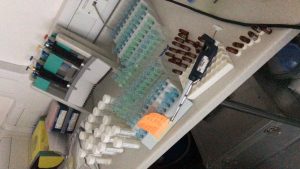
This paper shows for the first time that donor human milk in the UK has very low levels of essential fatty acids, which are important for brain and eye development. Furthermore, donor human milk has higher lipid degradation than preterm and term breast milk. This could have important implications for preterm infant nutrition as exclusive unfortified donor human milk feeding might not be suitable long term and may contribute to the development of major neonatal morbidities.
This study followed from a narrative review Isabell and her supervisors Prof Minesh Khashu and Dr Simon Dyall published last year, which suggested that current human milk banking practices might have detrimental effects on essential fatty acid quality and quantity in donor human milk (2).
Isabell
Reference
- Nessel, Isabell, et al. “Long‐Chain Polyunsaturated Fatty Acids and Lipid Peroxidation Products in Donor Human Milk in the United Kingdom: Results From the LIMIT 2‐Centre Cross‐Sectional Study.” Journal of Parenteral and Enteral Nutrition(2020).
- Nessel, Isabell, Minesh Khashu, and Simon C. Dyall. “The effects of storage conditions on long-chain polyunsaturated fatty acids, lipid mediators, and antioxidants in donor human milk–a review.” Prostaglandins, Leukotrienes and Essential Fatty Acids(2019).
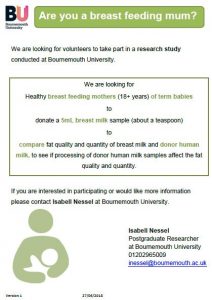
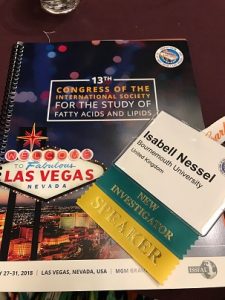
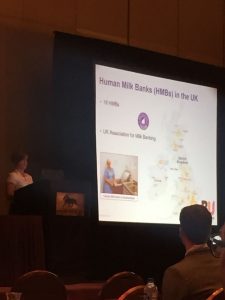 Methodology and Ketoneurotherapeutics. In between, well-known researchers in the field presented their research in plenary talks. Dr Michael Crawford obtained an omega-3 research award and Dr Maria Makrides was awarded with the Alexander Leaf Award. Her presentation entitled “Standing on the shoulders of giants: great women role models, mentors and advocates” was really inspiring.
Methodology and Ketoneurotherapeutics. In between, well-known researchers in the field presented their research in plenary talks. Dr Michael Crawford obtained an omega-3 research award and Dr Maria Makrides was awarded with the Alexander Leaf Award. Her presentation entitled “Standing on the shoulders of giants: great women role models, mentors and advocates” was really inspiring.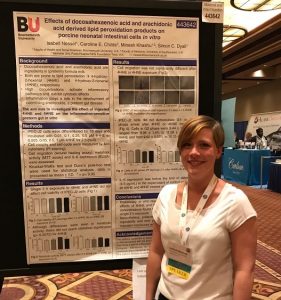 banking practices and recommendations for improvement”, presenting the results of our UK Milk Bank survey, which is now extended internationally. Furthermore, I had two posters displaying our work on preterm formula milk storage conditions and lipid degradation; and the effects of lipid degradation products on intestinal cells in vitro. These presentations gave me the possibility to position myself in the fatty acid research world and to make valuable contacts.
banking practices and recommendations for improvement”, presenting the results of our UK Milk Bank survey, which is now extended internationally. Furthermore, I had two posters displaying our work on preterm formula milk storage conditions and lipid degradation; and the effects of lipid degradation products on intestinal cells in vitro. These presentations gave me the possibility to position myself in the fatty acid research world and to make valuable contacts.
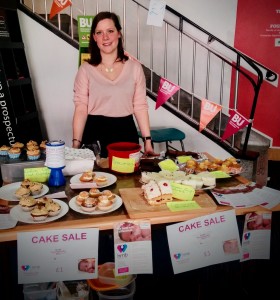 The amount raised will help to either
The amount raised will help to either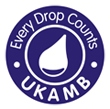 If you would like to learn more about donor milk visit the website of the
If you would like to learn more about donor milk visit the website of the 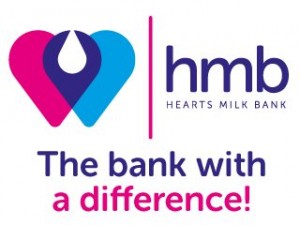 If you would like to learn more about the
If you would like to learn more about the  Date: 17th November
Date: 17th November Preterm born babies are at high risk to develop a wide range of complications.
Preterm born babies are at high risk to develop a wide range of complications.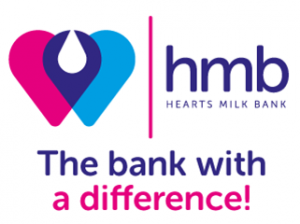 The
The 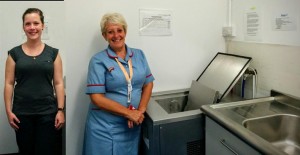 Most of you have probably heard/read about human milk banking by now from me or my previous posts, if not read
Most of you have probably heard/read about human milk banking by now from me or my previous posts, if not read 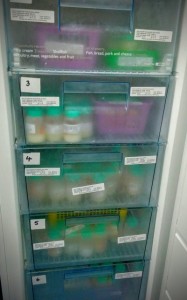
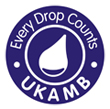 If you would like to find out more about human milk banking in the UK or want to become a human milk donor visit the UK Association for Milk Banking website at
If you would like to find out more about human milk banking in the UK or want to become a human milk donor visit the UK Association for Milk Banking website at 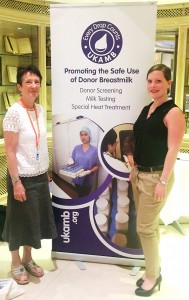











 Read and sign up to BU’s Policy Influence Digest
Read and sign up to BU’s Policy Influence Digest Upcoming opportunities for PGRs – collaborate externally
Upcoming opportunities for PGRs – collaborate externally BU involved in new MRF dissemination grant
BU involved in new MRF dissemination grant New COVID-19 publication
New COVID-19 publication MSCA Postdoctoral Fellowships 2024
MSCA Postdoctoral Fellowships 2024 Horizon Europe News – December 2023
Horizon Europe News – December 2023